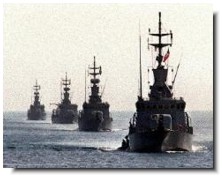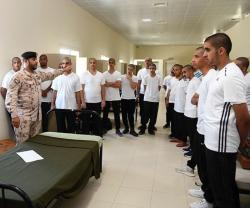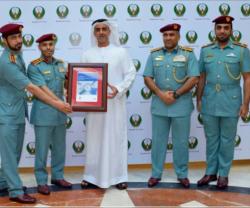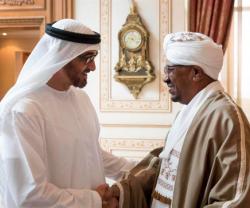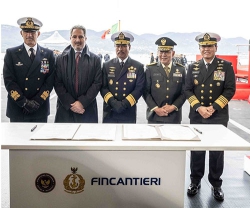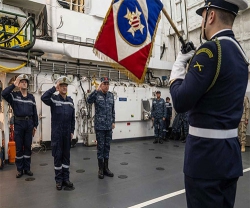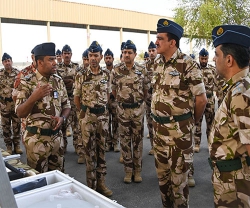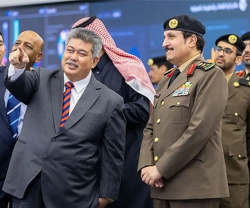Fincantieri to build U.A.E. corvette
19.08.2009 UAE
Italian shipbuilder Fincantieri has won a contract to build a 1,650-ton corvette for the U.A.E. navy amid a drive by Gulf Arab states to build up their naval strength.
The United Arab Emirates also has an option for a second corvette for what will be designated the navy's Abu-Dhabi class. The design is based on the 270-foot Commandante Cigala Fulgosi-class ships in service with the Italian navy.
According to Jane's Navy International, published in London, the U.A.E. corvette will be primarily deployed "for patrol and surveillance missions, but will include facilities for an embarked helicopter and an organic anti-submarine warfare capability."
The U.A.E. navy was originally created as a coastal force. But, along with those of Saudi Arabia and Oman, it has been building a deepwater capability to operate in the Arabian Sea outside the Gulf, where the maritime threat, primarily from Iran, has grown in recent years.
The new warship will be equipped with Thales' Captas Nano lightweight low-frequency active sonar and two launchers for the C310 torpedo countermeasures system, Jane's reported.
It will be armed with a quad launcher for four MM440 Exocet anti-ship missiles produced by Europe's MBDA company, a Super Rapid 76mm naval gun and two 30mm guns.
The corvette will be built at Fincantieri's Riva Trigoso yard. The company has not released the value of the contract. However, there were reports in March that the United Arab Emirates was seeking two corvettes under a $117 million contract.
The new ship, with a crew of 70, will be powered by two 7,000-kW-rated diesel engines, with a top speed of 25 knots, a cruising speed of 14 knots and a range of 3,000 nautical miles.
Three subsidiaries of the Italian Finmeccanica company -- Selex Sistemi Integrati, Subacquei (WASS) and Oto Melara -- were awarded contracts totaling $63 million to supply weapons, sensor and command systems.
MBDA signed an agreement with the U.A.E.-based Baynuna Aviation Technology in February to develop the emirates' capability to produce weapons systems and associated technology.
The U.A.E. has become a regional powerhouse in terms of building its own defense industry.
One of the key nodes in this program is Abu Dhabi Ship Building, which is already contracted to build six corvettes for Project Baynunah, the navy's flagship procurement program.
ADSB won the $540 million contract in December 2003 in conjunction with France's Construction Mecaniques de Normandie.
ADSB and Raytheon Missile Systems of the United States are discussing the establishment of a U.A.E.-based support facility for RIM-116 Rolling Airframe Missile ammunition for the U.A.E. navy as part of the Baynunah program.
Meantime, the Al Shamikh, the first of three 300-foot Project Khareef corvettes for the Royal Navy of Oman, has been floated out by British shipbuilder BVT in the United Kingdom.
The lead ship is due for delivery in early 2010, with the other two following at six-month intervals, under the $652 million contract signed in January 2007.
The sultanate of Oman, on the southeastern tip of the Arabian peninsula, shares control of the chokepoint Strait of Hormuz, the only gateway to the Gulf, with the Iranian navy.
The 2,500-ton vessels will be armed with eight MBDA Exocet Block 3 anti-ship missiles, two launchers for short-range MBDA VL MICA anti-air missiles and Oto Melara 76mm Super Rapid gun and two 30mm guns. It will also carry a British-built Lynx helicopter.
Yemen, Oman's western neighbor, is expected to receive one or two 87-foot Marine Protector-class coastal patrol craft from the United States to boost its counter-piracy capabilities.
The 91-ton vessels are built by Bollinger Shipyards of Lockport, La., for the U.S. Coast Guard.
Finally, Algeria is competing for three F2000 offshore patrol vessels built in the United Kingdom for the Royal Brunei Navy but never put into service by the oil-rich Borneo sultanate.
Algeria, which is also upgrading its naval forces in the western Mediterranean, had been mulling custom-built frigates but is now considering the offshore patrol craft as a first step.
The United Arab Emirates also has an option for a second corvette for what will be designated the navy's Abu-Dhabi class. The design is based on the 270-foot Commandante Cigala Fulgosi-class ships in service with the Italian navy.
According to Jane's Navy International, published in London, the U.A.E. corvette will be primarily deployed "for patrol and surveillance missions, but will include facilities for an embarked helicopter and an organic anti-submarine warfare capability."
The U.A.E. navy was originally created as a coastal force. But, along with those of Saudi Arabia and Oman, it has been building a deepwater capability to operate in the Arabian Sea outside the Gulf, where the maritime threat, primarily from Iran, has grown in recent years.
The new warship will be equipped with Thales' Captas Nano lightweight low-frequency active sonar and two launchers for the C310 torpedo countermeasures system, Jane's reported.
It will be armed with a quad launcher for four MM440 Exocet anti-ship missiles produced by Europe's MBDA company, a Super Rapid 76mm naval gun and two 30mm guns.
The corvette will be built at Fincantieri's Riva Trigoso yard. The company has not released the value of the contract. However, there were reports in March that the United Arab Emirates was seeking two corvettes under a $117 million contract.
The new ship, with a crew of 70, will be powered by two 7,000-kW-rated diesel engines, with a top speed of 25 knots, a cruising speed of 14 knots and a range of 3,000 nautical miles.
Three subsidiaries of the Italian Finmeccanica company -- Selex Sistemi Integrati, Subacquei (WASS) and Oto Melara -- were awarded contracts totaling $63 million to supply weapons, sensor and command systems.
MBDA signed an agreement with the U.A.E.-based Baynuna Aviation Technology in February to develop the emirates' capability to produce weapons systems and associated technology.
The U.A.E. has become a regional powerhouse in terms of building its own defense industry.
One of the key nodes in this program is Abu Dhabi Ship Building, which is already contracted to build six corvettes for Project Baynunah, the navy's flagship procurement program.
ADSB won the $540 million contract in December 2003 in conjunction with France's Construction Mecaniques de Normandie.
ADSB and Raytheon Missile Systems of the United States are discussing the establishment of a U.A.E.-based support facility for RIM-116 Rolling Airframe Missile ammunition for the U.A.E. navy as part of the Baynunah program.
Meantime, the Al Shamikh, the first of three 300-foot Project Khareef corvettes for the Royal Navy of Oman, has been floated out by British shipbuilder BVT in the United Kingdom.
The lead ship is due for delivery in early 2010, with the other two following at six-month intervals, under the $652 million contract signed in January 2007.
The sultanate of Oman, on the southeastern tip of the Arabian peninsula, shares control of the chokepoint Strait of Hormuz, the only gateway to the Gulf, with the Iranian navy.
The 2,500-ton vessels will be armed with eight MBDA Exocet Block 3 anti-ship missiles, two launchers for short-range MBDA VL MICA anti-air missiles and Oto Melara 76mm Super Rapid gun and two 30mm guns. It will also carry a British-built Lynx helicopter.
Yemen, Oman's western neighbor, is expected to receive one or two 87-foot Marine Protector-class coastal patrol craft from the United States to boost its counter-piracy capabilities.
The 91-ton vessels are built by Bollinger Shipyards of Lockport, La., for the U.S. Coast Guard.
Finally, Algeria is competing for three F2000 offshore patrol vessels built in the United Kingdom for the Royal Brunei Navy but never put into service by the oil-rich Borneo sultanate.
Algeria, which is also upgrading its naval forces in the western Mediterranean, had been mulling custom-built frigates but is now considering the offshore patrol craft as a first step.
Previous PostDAFZ opens new police office
Latest news
Latest events
Doha International Maritime Defence Exhibition & Conference (DIMDEX 2026)
19 - 22 Jan 2026Doha - QatarUMEX – SimTEX
20 - 22 Jan 2026ADNEC Centre Abu Dhabi, - United Arab EmiratesWorld Defense Show (WDS) 2026
08 - 12 Feb 2026Riyadh - Saudi ArabiaSAHA EXPO International Defence & Aerospace Exhibition
05 - 09 May 2026İstanbul Expo Center - Turkey

